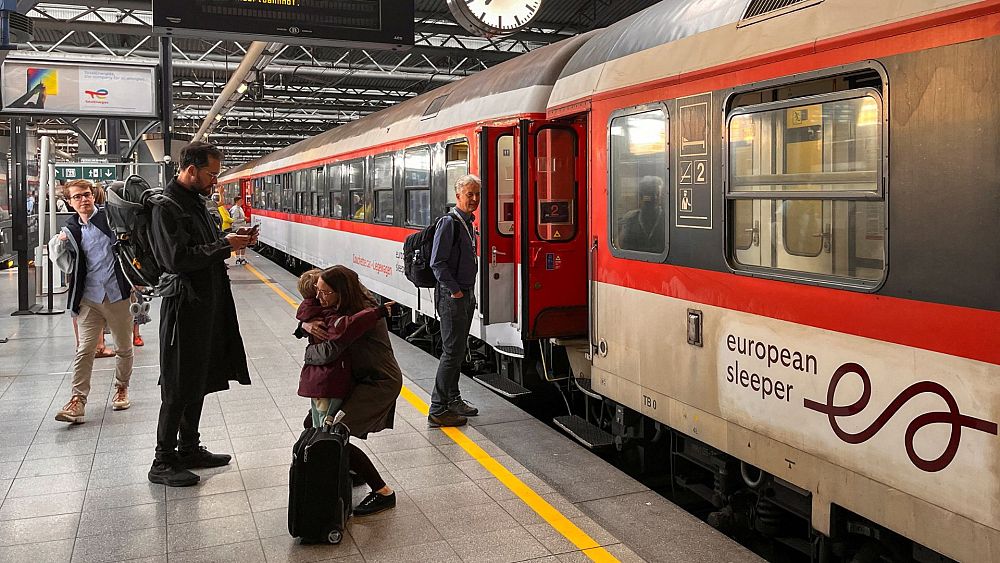Europe’s night trains face fierce competition from budget airlines.
Sarah and Sonia step off a rain-soaked train at Berlin Central Station, surprised to feel so rested after sleeping on Europe’s newest night train service, but also more than an hour late.
“When you see the beds, they don’t look like the most comfortable ones,” says Sarah, a midwifery student from Belgium. But, after the journey from Brussels, stuffed into their backpacks, the friends feel ready for a weekend of sightseeing.
They traveled with European Sleeper, a Dutch-Belgian startup whose launch in May is part of a renaissance in overnight train travel.
The company says there is demand for such services, which they offer a lower emissions an alternative to planes for climate-conscious travellers, whilst bringing back some of the romance of an older, slower form of travel.
But the revival faces many hurdles, from securing funding and profits amid cutthroat competition low cost airlinesto the management of reliable services on the overcrowded and obsolete European rail network.
Contenuti
ToggleWhat’s holding back the resurgence of sleeper trains in Europe?
Sarah and Sonia’s train is a case in point. European Sleeper said he endured a long back and forth with the national team train the operators agree on the timetables of the Brussels-Berlin service.
“It’s very bureaucratic and complicated,” Chris Engelsman, co-founder of European Sleeper, told the Reuters news agency.
The company also spent a year and a half scouring Europe for second-hand sleeping cars train coaches to rent. The refurbished sleepers in off-white and faded red had cases of faulty power outlets and broken toilets as they carried more than 20,000 people during the European Sleeper’s first summer season.
In extreme cases, last-minute technical failures have forced the company to downgrade some passengers to night or night seats Cancel their tickets altogether.
“The main investment we’re looking for right now is in rolling stock, because it’s a critical part of the whole business,” Engelsman said.
The company hopes to raise 40-60 million euros to buy its buses, 10 times the amount raised so far from investors and crowdfunding.
Other operators are supported by government money, with Austrian OBB leading the way.
It is expanding its Nightjet network, which carried 1.5 million passengers last year sleeper carriages often booked weeks in advance. Two new routes connecting Berlin with Paris and Brussels will start in December.
The OBB spent 720 million euros on 33 new generation vehicles night trainsdeveloped with Siemens Mobility.
“There is higher demand,” said Alberto Mazzola, executive director of the CER lobby representing European rail companies.
“But the main challenge is the business plan.”
Night trains face tough competition from low-cost airlines
Years of decline in Europe night railway network coincided with the rise of low-cost airlines.
Today at night train Berlin to Zurich costs around €160 and takes more than 12 hours. An easyJet flight between the two cities is much quicker, including airport security, and costs less than half as much.
The Norwegian government’s calculations highlight the profitability challenge. Last year it dampened hopes for a new route from Oslo to Copenhagen, saying it would have to spend up to 3.8 million euros a year in subsidies to offer Tickets at a price that travelers are willing to pay.
“It’s not easy and it’s not our goal to get rich,” Engelsman said of European Sleeper.
His company is planning to expand, however, starting with the long-delayed extension of its line to Prague starting in March 2024. It is also considering a route from Amsterdam to Barcelona.
Supporters of night trains are pushing for more state aid to compete with low-cost airlinessuch as exemption from value added tax on cross-border routes and reduction of access costs to railway lines.
France said in September it would seek support for a minimum price on flights in the European Union to try to reduce it airline companiescontribution to climate change, which could also help.
Aside from cost pressure, night train operators must navigate the old European network of mismatched gauge systems and different languages.
At night, trains they compete with freight traffic and construction work and during the morning hours compete for arrival times at stations with commuter services.
Sarah and Sonia’s trainEuropean Sleeper service ES453 arrived at 7.57am, one hour and nine minutes late.
But Sonia didn’t care: “We could sleep a little longer.”
Image:Getty Images






